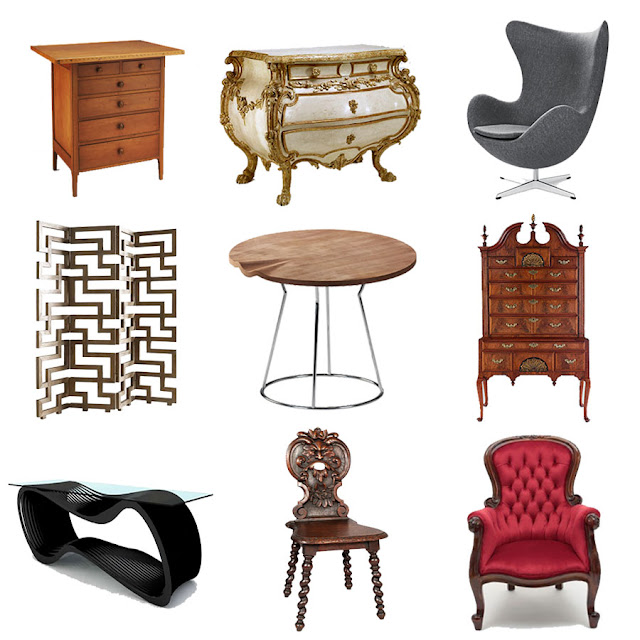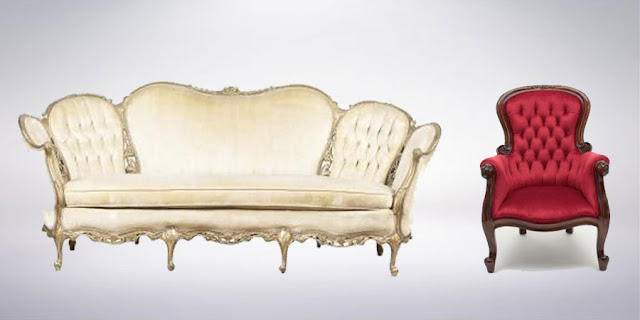 |
| Can You Identify These Different Furniture Styles...? |
It can be very difficult to differentiate between these styles though and you may have heard phrases like a "Queen Anne Chair", a "Shaker Kitchen" or "Bauhaus Nesting Tables" without being able to visualise what that actually looked like. Well that is where this article comes in handy as we will list all the main furniture design styles and outline their identifying features so you can tell your Art Nouveau from your Arts and Crafts!
This article outlines the following furniture design styles ...
Egyptian Furniture
 |
| Egyptian Style Furniture |
When we think of Egyptian furniture we imagine the intricate gold gilded ornate furniture found in the tombs of the Pharaohs as opposed to the simple chairs, tables and baskets of the ordinary Egyptians.
The identifying features of ancient Egyptian furniture are...
- beech wood and mahogany
- ornate designs using different colors
- depicting animals, gods and goddesses
- gold gilding and inlays
- mosaic designs
- mother-of-pearl inlays
Greek Furniture
 |
| Greek Style Furniture |
Ancient Greek furniture is possibly still most remembered for the famous klismos chair, shown above.
The identifying features of ancient Greek furniture are...
- elegant and tasteful
- detailed carving and inlays
- select detailing, not cluttered
- comfortable rather than decorative
Renaissance Furniture
 |
| Renaissance Style Furniture |
Along with the other arts, the Italian Renaissance of the fourteenth and fifteenth century marked a rebirth in furniture design, often inspired by the Greco-Roman traditions.
The identifying features of renaissance furniture are...
- ornate and opulent
- form above function
- gilded designs
- floral, vegetable and scrolling ornamentation
Jacobean Furniture
 |
| Jacobean Style Furniture |
After the Renaissance there was a gradual change to a less ornamented, quieter style of furniture.In general furniture profiles became lower and more rectangular.
The identifying features of Jacobean furniture are...
- stern, square, and frugal
- colourful upholstery with tasselled trim
- straight lines & rigid designs
- sturdy construction
- dark finish
Queen Anne Furniture
 |
| Queen Anne Style Furniture |
The Queen Anne style is a style with a moderate proportion and graceful appearance. It is named after Queen Anne of England who reigned from 1702-1714.
The identifying features of Queen Anne furniture are...
- graceful and refined
- cabriole legs terminating in a pad or drake foot
- fiddle-back chair backs
- bat wing shaped drawer pulls
- cushioned and covered with fabric
Colonial furniture
 |
| Colonial Style Furniture |
These pieces were generally sturdy and heavily carved, many with turned legs and bun feet. In the harsher environment of some of the Colonies these pieces were simpler representatives of their parent styles, befitting the more straightforward and utilitarian life of the settlers.
The identifying features of colonial furniture are...
- less ornate than European furniture of the same style period
- combing features of previous styles
- variety of wood types used
- chair arms have slight outward curve
Rococo Furniture
 |
| Rococo Style Furniture |
In the eighteenth century, furniture design began to develop rapidly and styles such as Rococo and Neoclassicism were commonplace throughout Western Europe.
The identifying features of Rococo furniture are...
- Natural motifs
- Elaborate carved forms
- Asymmetry
- Curved forms are common in Rococo
- Rocaille carving
- Acanthus leaf
Shaker furniture
 |
| Shaker Style Furniture |
The Shaker style was produced by the religious group the United Society of Believers in self-contained communities in the United States.
The identifying features of shaker furniture are...
- simple, utilitarian style
- straight tapered legs
- woven chair seats
- and mushroom-shaped wooden knobs
- rectilinear and attenuated forms
- restrained ornamentation
Back to Top
Victorian furniture
 |
| Victorian Style Furniture |
The Victorian style draws its influence from previous Gothic forms. It is named for Queen Victoria of England who reigned from 1837-1901 and was the first furniture style of mass production.
The identifying features of Victorian furniture are...
- heavy proportions
- dark finish
- elaborate carving and ornamentation.
- somber appearance
- balloon-shaped chair backs
Arts & Crafts furniture
 |
| Arts and Crafts Style Furniture |
Arts & Crafts furniture is simple, with straight lines and little ornamentation.The terms Mission and Craftsmen can also used to describe Arts and Crafts furniture.
The identifying features of Arts & Crafts furniture are...
- rectilinear design
- simple, straight construction
- exposed joinery
- using medium or dark stained oak
- bail handles with rectangular back plate
Art Nouveau Furniture
 |
| Art Nouveau Style Furniture |
The name "Art Nouveau" is French for 'new art', and it emerged in the late 19th century in Paris. The style was said to be influenced strongly by the lithographs of Czech artist Alphonse Mucha, whose flat imagery with strong curved lines was seen as a move away from the academic art of the time.
The identifying features of Arts Nouveau furniture are...
- intricately detailed
- lines and curves used as ornamentation
- inlays and veneers also used
- hard woods and iron commonly used
- strong yet slim furniture pieces
Bauhaus Furniture
 |
| Bauhaus Style Furniture |
The Bauhaus school was founded by Walter Gropius in Weimar in 1919. In spite of its name, and the fact that its founder was an architect, the Bauhaus was founded with the idea of creating a 'total' work of art in which all arts, including furniture would eventually be brought together.
The identifying features of Bauhaus furniture are...
- minimalist & non-ornamental
- hand crafted but appears mass produced
- organic and natural materials
- mainly black in color
- smooth and rounded shapes
Art Deco Furniture
 |
| Art Deco Style Furniture |
The Art Deco movement began in Paris in the 1920s and it represented elegance, glamour, functionality and modernity. Art deco's linear symmetry was a distinct departure from the flowing asymmetrical organic curves of its predecessor style Art Nouveau.
The identifying features of Art Deco furniture are...
- practical and simple designs
- founded on mathematical geometric shapes
- triangular shapes, chevron patterns, stepped forms, sweeping curves and sunburst motifs
- new materials such as aluminum, stainless steel, plastics and lacquer
- exotic materials like shark-skin and zebra-skin.
Modern Furniture
 |
| Modern Style Furniture |
The forms of modern furniture sought newness, originality, technical innovation, and ultimately conveyed the present and the future, rather than what had gone before it as revival styles had done. This interest in new and innovative materials and methods produced a certain blending of the disciplines of technology and art.
The identifying features of Modern furniture are...
- new materials included laminated plywood and fibreglass
- continued use of steel, moulded plywood and plastics
- simple and geometric shapes
- regular use of polished metal
- style considered pioneering, even shocking
Scandinavian Furniture
 |
| Scandinavian Style Furniture |
Simplicity and function are the guiding principles that have shaped the design sensibilities of Nordic Europe.
The identifying features of Scandinavian furniture are...
- natural materials, mainly wood
- favour neutral colour palettes
- clean, simple lines
- optimal function out of every part of the piece
- robust and fuss-free



















